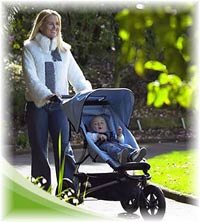|
|

|
|
Children pushed in buggies which face away from their parents may suffer long-term emotional and language problems, according to a study published on Friday.
|
Children pushed in buggies which face away from their parents may suffer long-term emotional and language problems, according to a study published on Friday.
The research, believed to be the first of its kind, found that children who were not facing the person that pushed them were less likely to talk, laugh and interact with their parents compared with those babies that did.
The findings were based on a study of 2,722 parents and babies and an experiment where 20 babies were wheeled in buggies for a mile, facing their parents for half the journey and facing away for the other half.
Parents using face-to-face buggies were twice as likely to talk to their children while the heart rates of the babies fell and they were twice as likely to fall asleep, an indicator that they were feeling relaxed and safe.
Additionally only one baby out of the 20 studied laughed while sitting in an away-facing buggy.
"Our data suggests that for many babies today, life in a buggy is emotionally impoverished and possibly stressful," said Dr Suzanne Zeedyk, Developmental Psychologist at Scotland's Dundee University who carried out the research.
"Stressed babies grow into anxious adults."
The study, which was published by National Literacy Trust as part of its Talk To Your Baby campaign, found that 62 percent of all children observed travelled in away-facing buggies, rising to 86 percent between the ages of 1 and 2.
Zeedyk said it would impact negatively on babies' development if they spent a long time in a buggy which undermined their ability to communicate with their parent at a time when their brain was developing rapidly.
Laura Barbour of the Sutton Trust, a social mobility charity which funded the research, said buggy manufacturers should look closely at the findings.
点击查看更多双语新闻
(Agencies)
|
上周五公布的一项研究表明,坐童车背对父母的宝宝今后可能会出现情感和语言方面的长期障碍。
研究发现,与在童车里面对父母而坐的宝宝相比,背对父母的宝宝更不爱说笑,也不爱与父母交流。这项研究尚属该领域首次。
研究人员对2722对父母和宝宝进行了一项研究,并对20个坐童车的宝宝开展了一项实验。研究人员让父母推着宝宝走一英里的路程,其中半英里让宝宝面向他们,另一半路程让宝宝背对他们。
结果显示,使用面对式童车的父母与宝宝交流的几率为背对时的两倍,同时,宝宝的心律有所下降,睡着的几率为背对时的两倍,这表明此时宝宝很放松并有安全感。
在参与实验的20个宝宝中,仅有一个宝宝在背对父母而坐时笑了。
研究负责人、苏格兰邓迪大学的发展心理学家苏珊妮•兹迪克博士称:“我们的研究数据表明,如今很多宝宝的童车生活缺乏情感交流,还可能会感到紧张。”
她说:“心理紧张的婴儿成年后更容易焦虑。”
研究发现,有62%的宝宝坐背对式婴儿车,而在1岁至2岁的宝宝中,这一比例增至86%。这项研究由英国“全国读写信托”组织发布,是其开展的“与宝宝说话”活动的一部分。
兹迪克称,宝宝的大脑发育很快,如果这段时期让他们长时间地坐在阻碍他们与父母交流的童车里,那么会对他们的发育造成负面影响。
为该研究提供资金支持的“萨顿信托”教育慈善基金会的劳拉•巴伯尔称,童车生产商应密切关注这一研究结果。
(实习生许雅宁 英语点津姗姗编辑)
|